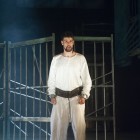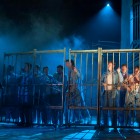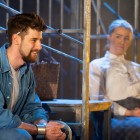Dead Man Walking 2019Royal Conservatoire of Scotland
Read more about the opera Dead Man Walking
New work at the Conservatoire
After the substantial demands made on the Conservatoire's resources last year by Kurt Weill's Street Scene, it was certainly hoped that the success of that project might lead to a follow-up. Jake Heggie's piece, premiered in 2000 by the San Francisco Opera, and derived from a recent (1993) book, was undoubtedly just such a hugely ambitious project. It is one of the most highly-praised and frequently performed of recent operatic works. For the Conservatoire to be able to give the first full staging in the UK was quite an achievement, and for it to be done with such conviction can only be worthy of the greatest praise.
Dead Man Walking tells the real life story of Joseph de Rocher, sentenced to death in Louisiana for the rape and murder of a teenage girl and boy. The opera looks at the contact between de Rocher (Mark Nathan) and Sister Helen Prejean (Carolyn Holt) as they strike up a pen pal relationship whilst de Rocher sits on Death Row awaiting his execution. These are long, hugely demanding roles for students to take on, and they both coped brilliantly - every word clear, every element of characterization truthful, no shirking the less attractive, obsessive aspects to their characters.
There is a great deal of complexity in the plotting. Sister Helen faces opposition first from her colleagues, then from the prison authorities. She then encounters the parents of the youthful victims, hurt and offended by her apparent lack of sympathy, and realises how little she can do, when saying 'Sorry' seems merely trite and almost offensive. All this while, Joseph remains an unsympathetic character, unrepentant, indeed in denial of the monstrosity of his actions. Only at the end does he confess and ask forgiveness, when the murdered girl's father has also modified his views, following the break-up of his marriage.
It is a fascinating narrative, generally well structured. It begins with the double murder, with its brutality emphasised - we never even learn the names of the two victims, even when we meet their parents later. There is a rapid switch to the nuns' working routine - a 'project' working with underprivileged children. This is perhaps given less that its full weight, consisting largely of relentlessly cheerful 'happy-clappy' hymns. Sister Helen is therefore easily distracted by the letters she receives from the convict on Death Row, largely to the bafflement of her colleague Sister Rose (Rebecca Godley). There follows her first big solo, as she drives to the penitentiary - a beautifully orchestrated sequence with plenty of character as well as chugging rhythmic elements of Stravinsky in Rake's Progress mode. Her encounter with the good-natured cop who stops her for speeding introduces one of a series of important cameos (from Rhys Alun Thomas).
On arrival at the prison, she encounters further opposition from both the Warden and the Chaplain, who receive detailed interpretations from MacArthur Alewel and Thomas Kinch. However the scene is dominated by the concrete bunker set with its moveable cage-frames, and a particularly important role for the chorus. They are reminiscent of the sailors in Billy Budd, though with absolutely no light relief - hardly surprising as they are all themselves on Death Row. What their performances does is to project the appalling heat and humidity of the Louisiana climate not otherwise obvious, as well as their boredom and easy brutality.
The tribunal at which Joseph's death sentence is confirmed seems a strangely perfunctory, even brutal, affair, but it introduces another strong characterisation from Joseph's mother (Fiona Joice) with her two bewildered sons and the four desperate parents of the victims. All add to the complexity of Sister Helen's feelings. The end of the first act consists of a huge ensemble in which she is assailed by conflicting thoughts derived from all those incidents we have seen. While that is credible dramatically it has to be said that there is musically a sense of overkill, of simply too much going on - choruses of convicts and children, plus appearances by all the soloists likely to cause as much confusion in the audience as the central character feels.
As would be expected, the second part concentrates far more on those characters we have met, and less on establishing the context. Joseph is advised by a guard of the date of his execution, and feigns indifference. There is an impressive scene in which Helen, now having nightmares, is comforted by her friend Rose. With only hours to go, she then fails once again to wring a confession out of Joseph. His final meeting with his mother is almost like a 'mad scene' for the old lady.
The final sequences reintroduce the chorus, either as protesters or as convicts. The hymn singing that was so jolly at the outset now takes on a far more serious tone, and at last there is a hint of a sympathetic side to Joseph's character.
Reflection on the work
All in all Dead Man Walking is an impressive piece of work given a performance of tremendous conviction by the large cast of singers and actors. James Holmes had complete control over his big orchestra and Caroline Clegg's direction was economical and generally maintained clarity despite the large forces involved.
Was there any serious reservation? The extensive list of Creatives included a Sound Designer - a role nowadays expected in musicals and even sometimes in straight plays in big theatres. However in opera the use of amplification has to be questioned. These singers showed no shortage of technical ability and the voices seemed quite powerful enough in this intimate auditorium.
It was therefore disappointing that there seemed to be no occasions when the intimate and meditative music could make its best effect. It all seemed a bit relentless and fatiguing, and the loud bits really were loud. Perhaps this was modified for the remaining three performances? It must be said, certainly, that consultation with other audience members who attended later performances indicates they encountered no difficulties.
Performance Cast
- Joseph de Rocher
- Sister Helen Prejean
- Mrs Patrick de Rocher mother of Joseph and Antony
- Sister Rose
- George Benton Prison Warden
- Father Grenville Prison Chaplain
- Kitty Hart mother of the murdered girl
- Owen Hart father of the murdered girl
- Jade Boucher mother of the murdered boy
- Howard Boucher father of the murdered boy
- Motorcycle Cop
- Sister Catherine
- Older Brother of Joseph and Antony
- Younger Brother of Joseph and Antony
- Sister Lillianne
- Prison Guard 1
- Prison Guard 2
- First Mother
- Mrs Charlton
- Solo Inmate 1
- Solo Inmate 2
- Solo Inmate 3
- Solo Inmate 4
- Solo Inmate 5
- Teenage Girl
- Teenage Boy
- Antony de Rocher Joseph's brother and accomplice
- Paralegal






